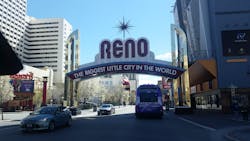An Industry Shift: APTA 2017 Bus & Paratransit Conference
The American Public Transportation Association (APTA) held its 2017 Bus and Paratransit Conference in Reno, Nevada, where local leaders provided an overview of transportation infrastructure of the region and the need for funding our nation's infrastructure.
Doran J. Barnes, chair, APTA, explained that as transit develops, agencies are working more toward electrification. “We’re learning together, we’re driving the future and we’re driving to see what the future brings.”
The Regional Transit Commission (RTC) highlighted how its agency has developed. Lee Gibson, executive director, RTC, explained, “Reno has been going to an amazing transformation as of recent ... I think that a lot of that credit is due to our mayor Hillary Schieve. Hillary Schieve was elected to the city council in 2014 and during that period of time there was just something amazing that happened with the ways that the issues were approached. “
Gibson said that Schieve has brought together the city and the agency with "a magical touch."
Schieve said, “I’m really proud of the infrastructure that is happening.”
Schieve went on to explain that she felt that the RTC — and transit systems — were key elements of having a vibrant and efficient city.
“When it comes to economic development, when it comes to jobs, you are on the forefront,” said Schieve. She went on to thank the RTC for helping increase and generate a more productive infrastructure for the city of Reno.
“Our city really is changing. We were one of the highest in foreclosure and employment,” explained Schieve. Since then, the area has had new companies move into the area and the city of Reno is changing.
Infrastructure Funding
Representative Mark Amodei (R-NV2nd District) stressed the importance of predictability and stability when it comes to infrastructure funding. "I'm a Republican. I don't get up looking for a tax increase to hug," he said, "but 6-, 9-month extensions are not the deal." And while the FAST Act's 5 years might look like the nirvana he stressed, it's not.
He added that as a whole, the industry has done a good job providing facts needed to make the necessary decisions and stressed, "Double down on that."
“It is important that we have a very strong presence in Washington, D.C. I can’t urge us enough that we continue to deliver that message,” said Barnes.
Richard White, acting president & CEO said, “For us to be successful we need to keep on doing what we’ve been doing and keep speaking as one industry.
"We got $110 million above the FAST Act. Congress took the facts. And when people are reasonable, they respond to it," he said.
White said that this conference may be the last time that the Bus and Paratransit conference convenes, due to the need to focus on the strategic thinking of the future and emerging trends. "A fairly influential online media entity said transit is not going to be relevant," he said, referencing technologies like transportation network companies, autonomous vehicles and the shared economy. "Some really think we'll be irrelevant.
He noted many agencies are already looked at as the mobility managers or transportation managers of the area; they go beyond simply providing bus service. "This is a chance for you to tell your story," he said. "We're shifting the argument.
“You attendees demonstrate our commitment to a successful future."
